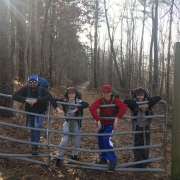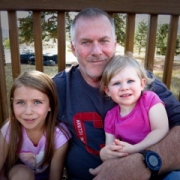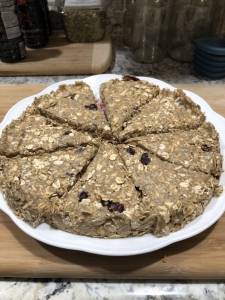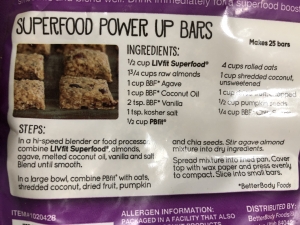Feed the Craving
That just about sums up the way most of us live. I noticed the sign at the entrance near my office today. It reminded me that I was craving sugar, or really bread.
We are “Craving” or spoiling ourselves to death!
Today was the third day of my attempt to follow the Whole30 Diet. After 3 days, I have a headache.
I’ll finish the 30 days because I want to be healthy, and also because there is something about NOT feeding the crave. There is something about NOT giving into all of our appetites, all of our desires, or all of our passions.
I read a book many years ago when I was taking a religious elective in college. It was, “The Freedom of Simplicity: Finding Harmony in a Complex World,” by Richard Foster. It challenged me to take a look at my life and think about ways to simplify it. Foster encouraged his readers to consider ways to divest themselves of things, events, friends, and ideas that eventually rob them of serenity. We believe that attaining wealth, friends, status, or attending the next concert will bring us happiness. We feed the cravings, but the cravings never go away. They are never satisfied.
So, I’m “Starvin’ the Cravin’” for 30 days. I’m not going to eat any table sugar or anything that has added sugar. I’m not going to eat bread (ouch) and I’m not going to eat any grains, dairy, and cheese. For the next 30 days, I’m going to go without any alcohol (boring!). I’ll do this and maybe, just maybe I’ll drop a few pounds and I’ll lower my risk of heart disease. Hopefully, I’ll get through these next 27 days and I’ll grow stronger, not just physically, but mentally.
Think about a craving that you continue to feed, but one that you’d like to starve to death.
I wrote a Blog titled The Unpopular Notion of Self-Denial in December of 2018. Here is what I wrote:
The Stoics believed that accumulating fame and fortune rarely if ever contributed to the Good Life. They believed that happiness did not come from getting the things that we desire, but rather, from learning to desire the things that we already possess. We learn to desire the things that we possess by periodically denying ourselves of them.
“We accomplish this,” writes Irvine, “by allowing ourselves to become hungry or thirsty, even though water and food are at hand, and we might sleep on a hard bed even though a soft one is available.” When we do this, Irvin asserts that we receive three benefits: 1) It will harden us against any misfortune that might befall us, 2) We will grow confident that we can handle any discomfort that might befall us, and 3) It will help us appreciate what we already have.
In other words, Self-Denial helps us grow!! It is when we periodically deny ourselves of the things that we desire and possess, that we learn the value of our things and the value of life.
So, I’m purposely going to deprive myself from the cravings that I have with hopes that It will change me. Give it a try!
Nutritional and Medical Disclaimer for True North Counseling, LLC
In viewing this website (and blog), it is assumed that you understand and acknowledge that the services and information, provided by True North Counseling, LLC may involve recommendation to improve your general health, fitness and well-being, including nutrition/diet advice and suggestions for physical activity. In accepting this information, understand that it is under your best discretion to be respectful to your body when engaging in physical activity and/or changing dietary habits. It is recommended to consult with your primary physician before starting any new/recent exercise or eating routine and to get annual check-ups to assess current health and fitness status. Do not overlook the importance of having a team-approach when health is involved. Regular visits with both your physician and registered dietitian will allow you to create the best possible, balanced approach in meeting health and performance/fitness goals.
















